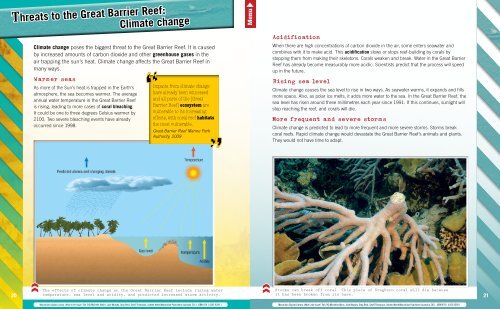GREAT BARRlER REEF - Saint Ignatius' Moodle Community
GREAT BARRlER REEF - Saint Ignatius' Moodle Community
GREAT BARRlER REEF - Saint Ignatius' Moodle Community
Create successful ePaper yourself
Turn your PDF publications into a flip-book with our unique Google optimized e-Paper software.
Threats to the Great Barrier Reef:<br />
Climate change<br />
Climate change poses the biggest threat to the Great Barrier Reef. It is caused<br />
by increased amounts of carbon dioxide and other greenhouse gases in the<br />
air trapping the sun’s heat. Climate change affects the Great Barrier Reef in<br />
many ways.<br />
Warmer seas<br />
As more of the Sun’s heat is trapped in the Earth’s<br />
atmosphere, the sea becomes warmer. The average<br />
annual water temperature in the Great Barrier Reef<br />
is rising, leading to more cases of coral bleaching.<br />
It could be one to three degrees Celsius warmer by<br />
2100. Two severe bleaching events have already<br />
occurred since 1998.<br />
Impacts from climate change<br />
have already been witnessed<br />
and all parts of the [Great<br />
Barrier Reef] ecosystem are<br />
vulnerable to its increasing<br />
effects, with coral reef habitats<br />
the most vulnerable.<br />
Great Barrier Reef Marine Park<br />
Authority, 2009<br />
Acidification<br />
When there are high concentrations of carbon dioxide in the air, some enters seawater and<br />
combines with it to make acid. This acidification slows or stops reef-building by corals by<br />
stopping them from making their skeletons. Corals weaken and break. Water in the Great Barrier<br />
Reef has already become measurably more acidic. Scientists predict that the process will speed<br />
up in the future.<br />
Rising sea level<br />
Climate change causes the sea level to rise in two ways. As seawater warms, it expands and fills<br />
more space. Also, as polar ice melts, it adds more water to the sea. In the Great Barrier Reef, the<br />
sea level has risen around three millimetres each year since 1991. If this continues, sunlight will<br />
stop reaching the reef, and corals will die.<br />
More frequent and severe storms<br />
Climate change is predicted to lead to more frequent and more severe storms. Storms break<br />
coral reefs. Rapid climate change would devastate the Great Barrier Reef’s animals and plants.<br />
They would not have time to adapt.<br />
20<br />
The effects of climate change on the Great Barrier Reef include rising water<br />
temperature, sea level and acidity, and predicted increased storm activity.<br />
Storms can break off coral. This piece of Staghorn coral will die because<br />
it has been broken from its base.<br />
21<br />
Macmillan Digital Library: What’s the Issue? Set 2 © Michelle Atkins, Julie Murphy, Greg Reid, Geoff Thompson, Ashten Warfe/Macmillan Publishers Australia 2011 ISBN 978 1 4202 9209 1 Macmillan Digital Library: What’s the Issue? Set 2 © Michelle Atkins, Julie Murphy, Greg Reid, Geoff Thompson, Ashten Warfe/Macmillan Publishers Australia 2011 ISBN 978 1 4202 9209 1







